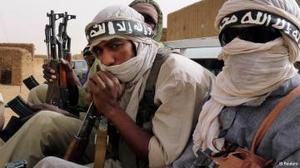TerrorismClinton: U.S. must lead fight against “jihadist threat” in Africa
In what sounded at times as a valedictory address, Secretary of States Hillary Clinton offered a far-ranging and detailed discussion of the new threat the United States and the world are facing: the spread of Islamist influence and jihadist terrorism in Africa. Clinton told a Senate committee that al Qaeda and its affiliates in the region threaten African and European allies and pose a direct threat to the United States.

Ansar al Din fighters in Mali // Source: elraaed.com
In what sounded at times as a valedictory address, Secretary of States Hillary Clinton offered a far-ranging and detailed discussion of the new threat the United States and the world are facing: the spread of Islamist influence and jihadist terrorism in Africa.
Clinton said the United States must increase its military and political intervention in north Africa, and warned of a long, difficult, but necessary struggle against a “spreading jihadist threat” in the region.
During a testimony before a Senate panel, Clinton pointed to the war against the Islamists in Mali as the most immediate and urgent crisis, but explained that there is a more general threat from the spread of influence in the region by al Qaeda and al Qaeda-affiliated groups.
She noted that the turmoil resulting from the Arab Spring, and the vast arsenals of sophisticated weapons in countries which, at least for the time being, do not have strong government structures, are making things worse throughout the region and beyond, citing the Islamist threat to Nigeria as an example.
“We now face a spreading jihadist threat. We have driven a lot of the AQ [al-Qaida] operatives out of Afghanistan, Pakistan. We have killed a lot of them, including, of course, Bin Laden. But we have to recognize that this is a global movement,” she said.
Clinton was testifying at a hearing by Senate committee on the 9/11 Benghazi consulate attack.
The Guardian reports that commenting on the growing threat from north African militants, Clinton said it would be a mistake to think that because the al Qaeda-aligned groups, which she called “not only a terrorist syndicate (but) a criminal enterprise,” have not attacked on U.S. soil, they do not represent a threat to America.
“What we have to do is to recognize we are in for a long-term struggle here. That means we’ve got to pay attention to places that historically we have not chosen to or had to,” she said.
“This Pandora’s box of weapons coming out of these countries in the Middle East and north Africa is the source of one of our biggest threats. There’s no doubt that the Algerian terrorists had weapons from Libya. There’s no doubt that the Malian remnants of al-Qaida in the Islamic Maghreb has weapons from Libya. We have to do a much better job,” she said.
Clinton singled out Mali as the most urgent crisis (yesterday, the United States began airlifting a French battalion to join the fight in Mali against Islamist militants). “This is going to be a very serious ongoing threat because if you look at the size of northern Mali, if you look at the topography, it’s not only desert, it’s caves – [it] sounds reminiscent. We are in for a struggle. But it is a necessary struggle. We cannot permit northern Mali to become a safe haven,” she said.
The political, military, and economic weakness of states in the region left the United States no choice but to increase its involvement, she said. “We have been working to upgrade security around northern Mali, around a number of the countries. Algeria is the only one with any real ability to do that. Most of these countries don’t have the capacity to do that. We are now trying to put together an African force from ECOWAS (the Economic Community of west African States) so that African soldiers will be in the front of this fight,” she said.
Clinton added: “We’ve got to have a better strategy. I would hope we have not only a strategy that understands making it possible for these governments to defend themselves better, for people to understand and agree with us that these terrorists are not in any way representative of their values, but that we can bolster democracy and tried to give these Arab revolutions a real chance to succeed.”
Clinton noted that Somalia offers an example of what U.S. military and diplomatic assistance can do to push back the jihadist threat. “Four years ago al-Shabab was one of the biggest threats not only to east Africa but the United States,” she said.
Clinton pointed out that the U.S. military training of the Ugandan and Burundian armies to intervene in Somalia, along with American money and knowhow, had changed the direction of events in Somalia and caused the Islamist threat recede.
“We have to make the decision we’re going to do the same in North Africa as well,” she said.
Clinton said there was also a need to reconsider the role and responsibilities of the U.S. Africa Command.
“Africom was stood up about ten years ago. I think a lot of people at the time wondered why would we have another command in the world and why in Africa. I now think we need to pay much more attention to Africom, to its capacity inside Africa,” she said.
